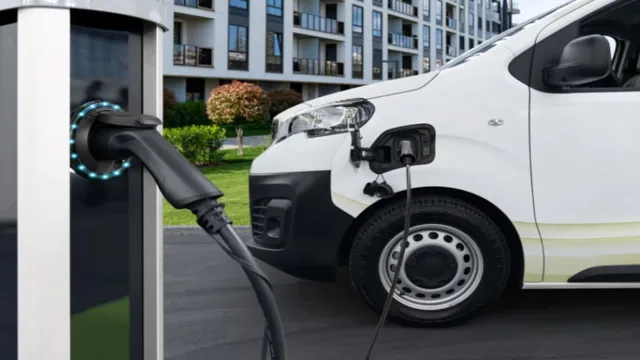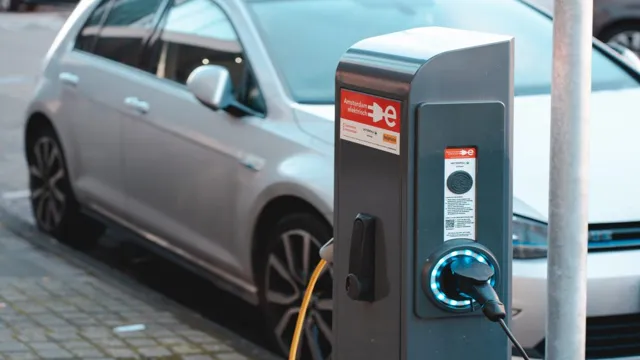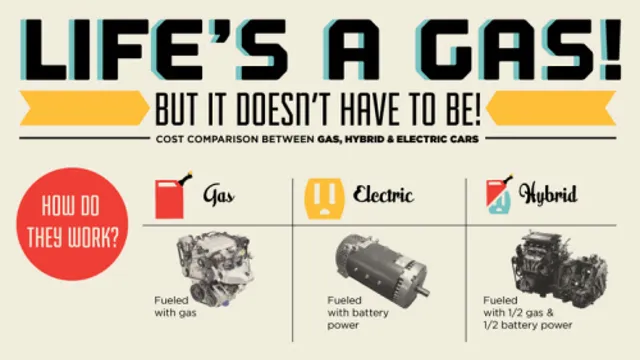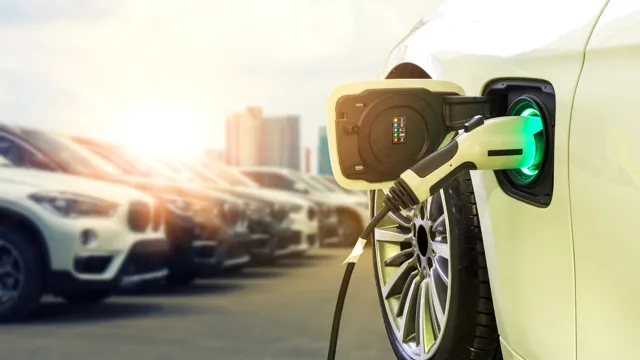Unleashing the Power of Electric Cars: Tax Benefits for Self-Employed Individuals
As a self-employed individual, you know that taxes can take a bite out of your income. But did you know that there are tax benefits available for those who invest in electric cars? Not only are these eco-friendly vehicles better for the environment, but they can also save you some serious cash come tax time. The federal government offers several incentives for those who purchase electric cars, and self-employed individuals are no exception.
These benefits include tax credits for purchasing an electric vehicle, as well as write-offs for expenses related to charging and maintaining the vehicle. Investing in an electric car can not only help you save money on taxes, but also help you stand out in your industry. With the increased focus on sustainability and eco-friendliness, your electric car can be seen as a statement of your commitment to reducing your carbon footprint.
So why not consider making the switch to an electric car? Not only can it have a positive impact on the environment, but it can also have a positive impact on your wallet. Plus, with the availability of charging stations on the rise, it’s easier than ever to make the switch.
Overview
If you are self-employed and considering buying an electric car, there are several tax benefits you may be eligible for. The federal government offers a tax credit of up to $7,500 for the purchase of a qualifying electric car. As a self-employed individual, you may also be able to deduct the cost of the car as a business expense if you use it for business purposes.
Additionally, if you install electric vehicle charging equipment at your business location, you may be eligible for a tax credit of up to 30% of the cost, up to a maximum of $1,000. These tax benefits can not only save you money in the short term, but also help reduce your carbon footprint and contribute to a more sustainable future. So, if you are in the market for a new car and are self-employed, it’s worth considering an electric car and taking advantage of the tax benefits available to you.
The tax credits available for electric cars
If you’re looking to buy an electric car, you’ll be pleased to know that there are tax credits available to make your purchase more affordable. These credits are offered by the federal government as well as some state governments, and they can take a significant chunk off the cost of your new electric vehicle. The federal tax credit for electric cars ranges from $2,500 to $7,500, depending on the battery capacity of the vehicle.
Some states also offer their own tax credits or rebates on top of the federal credit, making it even more worthwhile to make the switch to an electric car. So not only will you be doing your bit for the environment, but you’ll be saving money too.

How being self-employed affects tax benefits
Being self-employed comes with many benefits, but it also has an impact on taxes and tax benefits. When you work for yourself, you are responsible for paying both the employer and employee portion of Social Security and Medicare taxes, also known as self-employment taxes. However, being self-employed also opens up new tax benefits and deductions that are not available to traditional employees.
For example, you may be able to deduct expenses such as home office expenses, supplies, and business-related travel. Another benefit of being self-employed is that you have more control over when and how much you contribute to retirement accounts, which can also provide tax benefits. It is important to stay informed about your tax situation as a self-employed individual to take advantage of all the benefits available to you.
Deducting Business Use
As a self-employed individual, owning an electric car can offer you several tax benefits. One of the most significant is the deduction of business use expenses. You can deduct expenses for the use of your electric car while conducting business, such as driving to meetings with clients or commuting to and from job sites.
The IRS allows you to take advantage of this by calculating the percentage of your vehicle’s use for business purposes versus personal use, and deducting that percentage of expenses such as maintenance, repairs, and even charging costs. This deduction can save you a significant amount on your taxes, making an electric car an even more financially sound decision for your business. Don’t forget to keep detailed records of all your expenses for easy calculation come tax season.
So, if you own an electric car and use it for business purposes, consider taking advantage of the tax deductions available to you and save yourself some money in the long run.
How to calculate and deduct business use expenses
When running a business, it’s important to keep track of all expenses and determine which ones can be deducted for tax purposes. This includes any expenses related to the business use of your personal vehicle, home office, and equipment. To calculate the deductible amount, you need to first determine the percentage of time the item is used for business purposes versus personal use.
For example, if your vehicle is used 50% of the time for business purposes and 50% for personal use, then you can deduct 50% of the total expenses such as fuel, maintenance, and insurance. Similarly, if you use a room in your home as an office, you can calculate the percentage of your home that is used for business and then deduct that percentage of expenses for utilities, rent, and insurance. By keeping track of all expenses and properly calculating deductions, you can save money on taxes and maximize the profitability of your business.
IRS requirements for deducting business use expenses
If you’re a business owner, you know just how important it is to keep track of all of your expenses. One of the biggest expenses businesses face is the cost of using a personal vehicle for business purposes. Fortunately, the IRS does allow you to deduct those expenses as long as you meet certain requirements.
To qualify for this deduction, you must be able to prove that you use your vehicle primarily for business purposes. This means that at least 50% of the miles you drive must be for business-related activities. You’ll also need to keep detailed records of your car-related expenses, including gas, oil changes, repairs, and insurance.
And finally, you’ll need to be able to prove that the expenses you’re deducting are reasonable and necessary for your business. By following these guidelines, you can take advantage of a valuable tax deduction and keep your business expenses under control.
Leasing an Electric Car
If you’re self-employed and considering leasing an electric car, there are plenty of tax benefits to take advantage of. For starters, you could be eligible for the Section 179 deduction, which allows you to write off the entire cost of your leased electric car in the year that you put it into service. Additionally, you may be able to claim the federal electric vehicle tax credit, which can be worth up to $7,500 depending on the make and model of the car you lease.
These tax credits can help you reduce your taxable income and save you money in the long run. Plus, electric cars are often more cost-effective than gas-powered vehicles in terms of fuel and maintenance costs. So not only are you doing your part to help the environment, but you’re also making a smart financial decision for your business.
Leasing options for self-employed individuals
Leasing an electric car can be a smart move for self-employed individuals looking for reliable and eco-friendly transportation. Electric vehicles are becoming more popular and affordable, and leasing options can make them even more accessible. Leasing an electric car can help reduce upfront costs, provide the latest technology, and lower maintenance and fuel expenses.
One of the main advantages of leasing an electric car is the lower monthly payments compared to purchasing. Instead of paying the full price of the car, you are essentially borrowing it for a set period of time and paying for the depreciation only. Leasing also allows for the option of upgrading to the newest models with the latest features after a few years, keeping up with the fast-evolving EV technology.
Additionally, electric cars require less maintenance and no gas, providing significant savings in both time and money for busy self-employed individuals. Overall, leasing an electric vehicle can be a smart choice for those looking to reduce their carbon footprint without breaking the bank.
Tax benefits of leasing an electric car
Leasing an electric car not only helps you reduce your carbon footprint but also comes with great tax benefits. When you lease an electric car, you can claim federal tax credits that can significantly reduce your overall tax bill – up to $7,500. Moreover, you can also deduct lease payments, sales tax, and registration fees on your taxes, depending on the state you’re in.
In addition to saving on taxes, leasing an electric car could also be more cost-effective than purchasing one outright due to the initial investment required for purchasing an electric car. By leasing, you can drive a new, energy-efficient vehicle while enjoying the various tax benefits that come with it. All in all, leasing an electric car can be an excellent option for people who are environmentally conscious and are looking for ways to save money on their taxes.
Purchase and Financing Benefits
For self-employed individuals, purchasing an electric car can offer a range of benefits, including tax incentives. The Internal Revenue Service (IRS) offers a federal tax credit of up to $7,500 for the purchase of an eligible electric vehicle, which can significantly reduce the total cost of the car. Additionally, self-employed individuals may be able to take advantage of state and local tax incentives, such as exemptions from sales tax and rebates.
Financing options for electric cars are also often more favorable than those for traditional gasoline-powered vehicles. Many lenders offer lower interest rates and longer loan terms for electric cars to encourage their adoption. This can help make the switch to an electric car more affordable and convenient for self-employed individuals who may have fluctuating income or expenses.
Overall, the purchase and financing benefits of electric cars make them an appealing and smart investment for self-employed individuals who are looking to save money and reduce their carbon footprint.
Tax credits for purchasing or financing an electric car
When it comes to purchasing or financing an electric car, tax credits can be a huge incentive. In fact, these credits can save you thousands of dollars and make electric cars much more affordable. Many states and even the federal government offer these benefits, and they are definitely worth looking into if you are considering making the switch to an electric car.
Some credits are based on the cost of the car, while others are based on the size of the car’s battery. It is important to research which credits you may be eligible for before making a purchase or financing agreement. In the end, these tax credits can make a big difference in the cost of your electric car and can help to make the switch to electric even more appealing.
So next time you’re shopping for a new car or considering financing options, be sure to look into the tax credits for electric cars.
Loans and financing options available to self-employed individuals
When it comes to financial matters, self-employed individuals may face specific challenges in taking out loans and finding financing options. However, there are several benefits to being a self-employed borrower when it comes to purchasing and financing. For one, self-employed individuals have more flexibility in how they show their incomes to lenders.
For example, they can use bank statements or tax returns to demonstrate their earning potential. This is particularly useful if they have varying income streams or a fluctuating amount of income. Another benefit is that self-employed individuals can deduct certain expenses on their taxes, lowering their taxable income.
This can lead to a higher disposable income, which can further assist in securing a loan or financing from lenders. Overall, while obtaining loans and financing options may be more challenging for self-employed individuals, there are still several benefits to being a self-employed borrower to take advantage of.
Conclusion
In conclusion, the electric car tax benefits for self-employed individuals offer a shockingly good incentive to switch to electric vehicles. Not only do you save money on fuel costs, but you can also deduct a substantial portion of the purchase price on your taxes. Switching to an electric vehicle isn’t just good for the environment, it can also give your wallet a jolt in the right direction.
So, don’t be resistant to this electric current of progress and take advantage of these tax benefits today!”
FAQs
What tax benefits are available for self-employed individuals who purchase electric cars?
Self-employed individuals can receive a tax credit of up to $7,500 for purchasing an electric car. This credit can help offset the cost of the vehicle.
Are there any additional incentives for self-employed individuals who use their electric car for business purposes?
Yes, self-employed individuals may be able to deduct a portion of the cost of their electric car as a business expense on their tax return. They may also be eligible for additional incentives, such as access to HOV lanes or reduced tolls.
How do I claim the tax credit for purchasing an electric car as a self-employed individual?
To claim the tax credit for purchasing an electric car as a self-employed individual, you will need to fill out Form 8936 and include it with your tax return. This form will allow you to claim the appropriate credit amount based on the make and model of your electric car.
What other tax benefits are available to self-employed individuals who use electric cars?
In addition to the tax credit and business expense deduction, self-employed individuals who use electric cars may also be eligible for state and local tax incentives. These can vary by location, so it’s important to research what options are available in your area.





